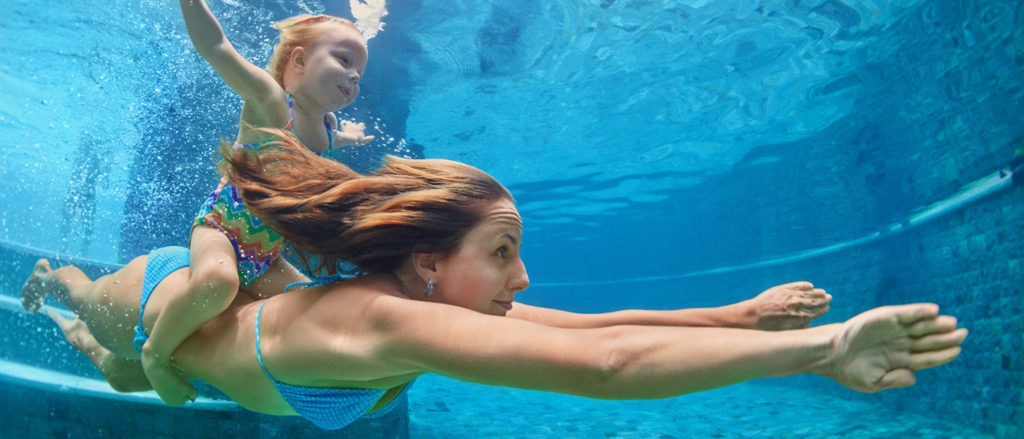Hearing protection for swimming, diving, surfing
Protect your hearing from the ingress of water

Swimming, diving and surfing should protect your ears from water, but not too much. The protective effect should therefore be focused on the water.
Our topic overview
- Why is it important to wear hearing protection when swimming, diving and surfing?
- What kind of hearing damage can be caused by water in the ear?
- Which hearing protection is suitable for swimming?
- Which hearing protection is suitable for surfing?
- Which hearing protection is suitable for diving?
- How does hearing protection work for different water sports?
- Where can I buy hearing protection for swimming, diving and surfing?
- How much does hearing protection for swimming, diving and surfing cost?
Why is it important to wear hearing protection when swimming, diving and surfing?
Every swimmer has usually had unpleasant experiences with water in the ear. This can even lead to middle ear infection, especially in children. With the right earplugs for swimmers, this unwanted effect can often be avoided from the outset. However, due to the sometimes very high water pressure at great depth, earplugs for diving must meet different requirements than earplugs for swimming. Even at depths of a few metres, a complete sealing of the ears against the penetrating water is usually no longer possible or recommended. You should therefore find out exactly what kind of hearing protection is right for your type of water sport.
What kind of hearing damage can be caused by water in the ear?
Because the water pressure in a normal swimming pool is higher than the air pressure in the human ear canal even at a depth of a few centimetres, the water displaces the air: the outer ear canal fills with water. This becomes a problem when it no longer runs out by itself. Children in particular often complain about an unpleasant feeling. With the right earplugs, however, children can swim more easily and enjoy playing in cool water. Depending on their age, parents should, however, use the earplugs for their children to swim or at least help them do so to prevent accidental injuries. The right water protection for the ears also ensures that no liquid gets inside the ears unintentionally during sporting activities or swimming training. However, if you do not use hearing protection, you may even develop so-called otitis media acuta or middle ear infection. Among other things, this can also be caused by bacteria species living in warm water while surfing. But other pathogens can also be the cause of such a disease. Swimmers of all ages should therefore protect themselves as well as possible from these, for example by using suitable earplugs for swimming.
Another possible medical problem is the so-called ear canal exostosis, which often causes undirected bone growth in the ear canal. This can make the patient more susceptible to further inflammation: For example, the bones can form new cavities in the ear or close existing ones, so that water that has once entered the ear cannot be easily removed from these spaces. According to new findings, this clinical picture is triggered by, among other things, exposure to a humid, windy climate. On the one hand, this is bad news for all enthusiastic surfers, as this weather is ideal for practising their favourite sport. But the good news is that the development of this type of ear canal exostosis can be prevented with appropriate measures. These precautions include suitable hearing protection. Important: If you are in any doubt about the choice or would like more detailed advice, it is best to discuss the various suitable options with your family doctor or ENT specialist. In particular, your doctor can usually best assess your individual case - whether it is earplugs for swimming for children, hearing protection for surfing for adults or any other topic. Of course, we cannot and must not replace professional medical advice with this short article.
Which hearing protection is suitable for swimming?
Earplugs specially designed for swimming and diving can effectively prevent the liquid from entering the ear. However, other earplugs, such as those used for sound insulation, are not fully recommended. It is important that the ear protector provides a reliable watertight seal between the inside and outside of the ear. In our online shop you will also find floating earplugs especially for children.
Which hearing protection is suitable for surfing?
Especially for professional surfers, but also for all others who like to be active on the surfboard, we offer the possibility to adjust the hearing protection to your own anatomy. For example, adapted hearing protection can often provide surfers with a more comfortable fit and better sealing of the ear canal against fluid penetration than the conventional all-round hearing protection. This is achieved by anatomically adapting the ear plug to the individual characteristics of the wearer's ear canal. By the way, this method is also available for the production of personally fitted earplugs for swimming - whether for children or adults.
Which hearing protection is suitable for diving?
Effective ear protection for diving at greater depths should not completely prevent water from entering the ear canal. The water pressure increases proportionally to the depth of the dive. In practice, this means that the deeper you dive, the greater the pressure of the water entering the ear. Earplugs would therefore be rather unsuitable for deeper dives in particular, as they would exert an ever greater force on the ear canal during the dive. For this reason, manufacturers often pursue somewhat different concepts in this area. One possibility is to ensure that the pressure in the ear does not change too quickly during descent and ascent. For swimmers who do not dive or who are only close to the water surface, sealing the ear against water ingress with earplugs is both practical and useful. For divers, on the other hand, earplugs with an inserted hole or a corresponding valve are more suitable. Both allow pressure equalisation and usually also allow water to enter the ear. The great advantage of hearing protection is that this pressure equalisation can be controlled. The unprotected ear of the diver, on the other hand, is defenceless against pressure fluctuations and water currents during the dive. In some cases, these can even lead to tinnitus, as the Apotheken-Umschau reports. Ideally, if you already have ear problems, you should consult your doctor before choosing suitable hearing protection.
How does hearing protection work for different water sports?
Normal earplugs for swimming are in most cases only suitable for diving to a very limited extent. This is because the aim of these products is to seal the ear as well as possible against liquid penetration. However, the greater the water pressure outside the ear canal, the deeper the regions of the water to be explored, the more the diver will be able to penetrate. If the auditory canal is completely sealed against this external pressure, the pressure inside the ear is sometimes much lower than outside. The tissue inside the ear is increasingly compressed by the external pressure with increasing depth. This can lead not only to severe pain in the ears, but also to tissue damage. For this reason, in most cases only diving depths of a few centimetres to about one metre are possible without problems with conventional waterproof earplugs for swimmers (depending on the product). While this is normally sufficient for practising common swimming techniques, this already becomes a problem when diving in the three-metre pool of the local open-air pool. In deeper waters, special diving hearing protection with a corresponding valve must be used. The water passes through the small valve drop by drop. This warms the water in the auditory canal and does not cool the outer and middle ear. This counteracts inflammation of the middle ear. In addition, the ear is not rinsed out by salt water and the skin retains its natural protective layer.
Where can I buy hearing protection for swimming, diving and surfing?
You can find hearing protection products for every type of water sport from various manufacturers and brands. Our wide range includes different types of hearing protection for children and adults.
Leading manufacturers and brands of hearing protection for swimming, diving and surfing:
- Docs Pro Plugs
- Otifleks
- Sanohra
How much does hearing protection for swimming, diving and surfing cost?
The cost of water hearing protection can vary depending on the type of hearing protection and manufacturer. Usually, earplugs for children are slightly cheaper and are available in our shop from around 10 euros. Special diving earplugs with valve are about 20 euros.
Our tip: If you dive, swim or surf regularly, we recommend custom-made hearing protection.
 EN
EN
 DE
DE
